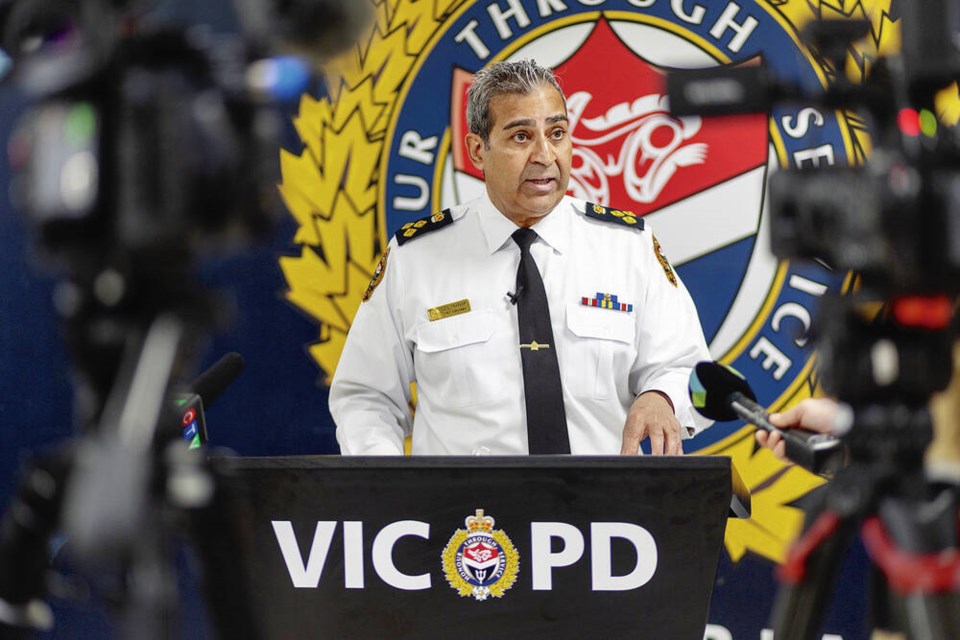One word jumps out from the Greater Victoria School Board’s vague response to Victoria Police Chief Del Manak’s appeal to drop the ban on police officers in schools in light of an escalating threat from gangs.
The board referred to “potential” gang activity in schools.
The word means possible as opposed to actual. In the context of the statement issued Friday, it implies Manak’s repeated warnings about gang activities in schools are about a danger that may or may not be developing in real time.
So he turned up the pressure on the school board Monday with more information on an arrest made public last week of an individual observed near three local schools. Police said the suspect was seen selling vape products to youth across from Esquimalt High School and Reynolds Secondary School, and interacting with youth on the property of North Saanich Middle School after school hours.
It strongly suggests that there was nothing “potential” about the gang threat.
Police say the suspect was selling vape products to students. They seized four imitation firearms, three knives, two masks and hundreds of nicotine and THC (cannabis) vapes.
The suspicion is that it’s part of an organized effort to target vulnerable students, recruit them and extort them into dealing with such products, then incurring debts, which are paid off under violent threats.
So a covert police operation resulted in one arrest (no charges yet).
But the other key front in dealing with this issue is police maintaining a presence in schools so victims are aware there is someone they can turn to if they find themselves in way over their heads.
And on that front, the school doors are still firmly closed to police in the Greater Victoria District. The liaison program was ended because “there are some students and staff who don’t feel safe with police in schools.”
The concern was that racialized students and others could feel traumatized by seeing uniformed officers in schools.
“We’re on the outside looking in,” Manak said Monday. “It’s extremely difficult when we have one hand tied behind our back …”
The board issued a statement responding to his previous plea to drop the ban on police in schools (except in emergencies or for lockdown drills). It was confusing, partly off-topic and contained nothing to indicate it’s going to drop the ill-considered policy imposed last year.
“We acknowledge that addressing potential gang activity in the South Island is the responsibility of policing services. We welcome any information the police can provide us … Where there is a safety risk … we will continue to activate our existing protocols to appropriately address it …”
The only adjustment is to move toward “a formal communication protocol.”
The current one is a ludicrous effort involving an app staff apparently use when strangers are seen on the grounds. Manak said that has resulted in police being questioned by staff when they do attend about why they are there.
So the board is standing pat, saying its current approach “goes beyond the mere presence of law enforcement.”
Board chair Nicole Duncan hailed the district’s dedication to “comprehensive strategies that prioritize prevention, intervention, on-going risk assessment and wraparound support…”
The school police liaison program is the textbook example of exactly those concepts. But her board shut it down last year and is showing no interest in changing its mind.
Premier David Eby told reporters Monday: “A key part of anti-gang activity is making sure that police do have access to schools.”
He supports police liaison programs personally, but said it’s up to elected school boards.
Public Safety Minister Mike Farnworth also supports the program.
The BC United Opposition started advocating in the legislature for a return of the program in Victoria.
BC Human Rights Commissioner Kasari Govender is also standing pat with her original stance urging that such programs be cancelled until there’s hard evidence that they work as advertised. In an interview Friday, she said concern about gangs is not enough to prompt a rethink.
There is strong evidence from elsewhere that shows such programs “cause more harm than good to certain racialized communities as well as, in some cases, young people with disabilities, people with mental health issues,” she said.
“I’m not saying; ‘Cancel the programs, no matter what the evidence is.’ I’m saying the opposite. Let’s conduct the research.”
There’s been no follow-up since she made that recommendation in 2022.
Just So You Know: Officials have now gone nine months debating this issue and returned to where they started. The school board issued a statement June 3, 2023 about gang concerns, the same day they publicized the decision to end the school police liaison program.
And Manak voiced a warning about gang recruiters at that time just as urgent as the one today.
>>> To comment on this article, write a letter to the editor: [email protected]





